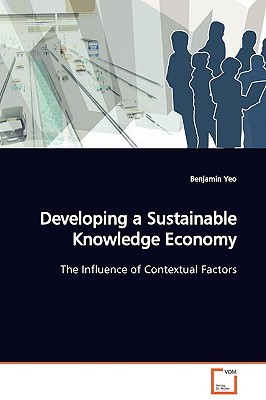
- We will send in 10–14 business days.
- Author: Benjamin Yeo
- Publisher: VDM Verlag
- ISBN-10: 3639126416
- ISBN-13: 9783639126419
- Format: 15.2 x 22.9 x 1.6 cm, softcover
- Language: English
- SAVE -10% with code: EXTRA
Reviews
Description
Today, the most technologically advanced economies in the world are knowledge-based. Governments are increasingly initiating efforts to utilize knowledge and information as direct and productive forces for the economic engine. The knowledge economy however, is dynamic and complex in contrast to the information economy. Scholars have applied a wide variety of definitions and perspectives to study it. In this book, the author addresses these differences and executes a multidisciplinary and empirical research method to analyze the development of a sustainable knowledge economy. Through interpretive case studies, the author develops an in-depth understanding of the influence of relevant contextual factors. This study includes discussions on key definitions, important themes, as well as critical theoretical implications. Beyond an impetus for further research, the findings constitute a useful guiding framework for policymakers to focus their investigations on various local conditions, so as to develop suitable and applicable policies for a sustainable knowledge economy.
EXTRA 10 % discount with code: EXTRA
The promotion ends in 17d.17:23:08
The discount code is valid when purchasing from 10 €. Discounts do not stack.
- Author: Benjamin Yeo
- Publisher: VDM Verlag
- ISBN-10: 3639126416
- ISBN-13: 9783639126419
- Format: 15.2 x 22.9 x 1.6 cm, softcover
- Language: English English
Today, the most technologically advanced economies in the world are knowledge-based. Governments are increasingly initiating efforts to utilize knowledge and information as direct and productive forces for the economic engine. The knowledge economy however, is dynamic and complex in contrast to the information economy. Scholars have applied a wide variety of definitions and perspectives to study it. In this book, the author addresses these differences and executes a multidisciplinary and empirical research method to analyze the development of a sustainable knowledge economy. Through interpretive case studies, the author develops an in-depth understanding of the influence of relevant contextual factors. This study includes discussions on key definitions, important themes, as well as critical theoretical implications. Beyond an impetus for further research, the findings constitute a useful guiding framework for policymakers to focus their investigations on various local conditions, so as to develop suitable and applicable policies for a sustainable knowledge economy.


Reviews